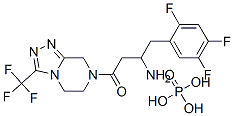Dipeptidyl peptidase 4 (DPP-4) is an intrinsic membrane glycoprotein that acts as an exopeptidase, cleaving oligopeptides after the second amino acid from the N-terminal end. One of its substrates is glucagon-like peptide 1, an incretin that stimulates insulin biosynthesis and secretion while inhibiting glucagon release in a glucose-dependent manner. Sitagliptin is a potent inhibitor of DPP-4 (IC50 = 18 nM). It only modestly inhibits DPP-8 (IC50 = 48 μM) and is without effect on several related peptidases, including DPP-9, DPP-II, and amino peptidase P. Sitagliptin is orally active, rapidly absorbed, and inhibits DPP-4 in plasma. It lowers fasting plasma glucose, glycosylated hemoglobin, and two-hour postprandial glucose levels in patients with type 2 diabetes. In addition to having use in type 2 diabetes, gliptins, including sitagliptin, have positive cardiovascular and anti-inflammatory effects.

